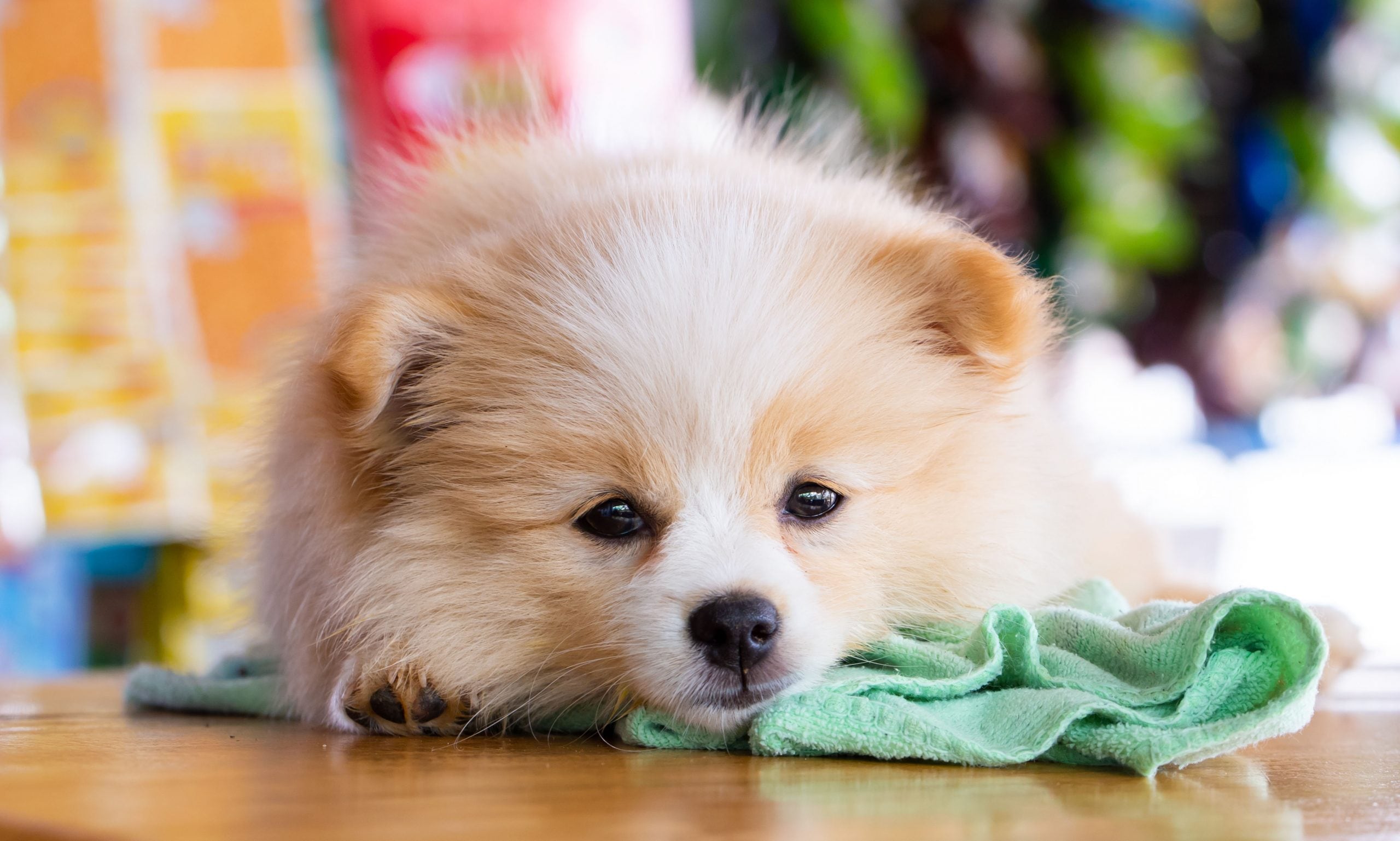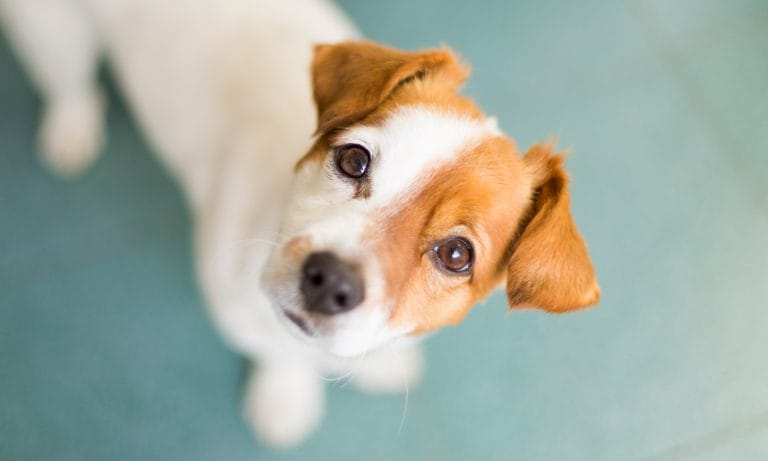Puppy vomit is common. This is because dogs have a well-developed vomiting center in their brains, which allows them to throw up much easier than many other animals. So, it’s normal for a puppy to vomit every once in a while, especially after eating something that’s upset their stomach or if they have a sensitive digestive system.
While most of the time harmless, puppy vomit can, however, be a sign of serious and even life-threatening illness. So, it pays to understand the full range of causes and implications.
FAQs about Puppy Vomiting
Q:
Is it normal for puppies to throw up?
A:
Yes, it is normal for puppies to vomit. Puppy vomiting is a common occurrence and is often a harmless and effective defense against puppy’s eating things they shouldn’t consume. Puppy vomit however can also be a sign of serious and even life-threatening illness. If your puppy vomits often, it’s time to call your vet.
Q:
Do puppies vomit often?
A:
Yes, it is not uncommon for puppies to vomit often.
Puppies are subject to a range of conditions and experiences that trigger vomiting such as eating too much, too often, eating foreign objects or intolerance to human foods, consuming toxic or poisonous substances, or as a reaction to conditions of stress or anxiety. How often is too often? Multiple episodes of vomiting on the same day or on subsequent days, vomiting accompanied by diarrhea, or acting sick or lethargic, or appearing to be in pain are indications that it is time to call your vet.
Q:
Why is my puppy vomiting yellow?
A:
If you are seeing yellow foam in your puppy’s vomit, that is bile, which is digestive juices produced by the liver. If your dog is throwing up bile with any frequency, you should have them checked out by a vet right away. Bile is a sign of a number of conditions that affect the digestive system, including inflammatory disease, ulcers, parasite infections and certain cancers. In each of these cases, the underlying condition needs to be diagnosed and treated by a veterinarian to relieve the vomiting.
Q:
Why is my puppy vomiting white foam?
A:
Your puppy could be vomiting white foam for several reasons. The most common reason is that the puppy has eaten something that has irritated the stomach, such as grass and plant material. There are other more serious reasons a puppy vomits white foam, including obstruction of the stomach or intestines, toxin exposure, pancreatitis and acid reflux. Coughing up white foam from kennel cough can often be mistaken for vomiting. If your puppy vomits white foam and acts sick in any way, call your vet for advice.
Q:
Why is my puppy vomiting after eating?
A: There are several reason why your puppy might be vomiting right after eating. Overly-enthusiastic eaters, stressed puppies or puppies who must compete with other dogs for food often eat too fast or too much food which can come right back up again. Try different solutions such as serving smaller meals more often throughout the day, placing food bowls in areas where there is less traffic or excitement, utilizing tools to slow down eating such as commercially-available slow feeder bowls, and where there is more than one dog in the house, feeding puppies in separate spaces can all help.
If the condition is not environmental or conditional but rather physical such as regurgitation, consult with your veterinarian for an appropriate solution.
Now, Let’s Get Into Why Dogs Vomit
Vomiting, the active expulsion of food from the stomach, evolved partially as a defense mechanism in response to a dog’s scavenger nature.
As you have probably observed, dogs will see something and eat it to find out if it’s edible. If it’s not, their body throws it back out the same way it came in. This is an unpleasant but harmless and effective defense against eating things they shouldn’t be consuming.
While vomiting is not a specific disease or a diagnosis in and of itself, it is a clinical sign that can occur with many diseases or conditions.
So, Should I Be Worried If My Puppy Throws Up?
Generally speaking, occasional bouts of puppy vomit are not uncommon. If your puppy vomits once in a blue moon then it is likely no cause for concern.
However, a puppy throwing up becomes more significant when:
- The vomiting does not stop
- There is blood in the vomit
- There is nothing left in the stomach to throw up except mucus and bile (the yellow fluid)
Age matters, too. In puppies 6 months old or less, vomiting is also a more serious condition than in older dogs because of their smaller size, immature immune systems and tendency to become easily weak and dehydrated.
While puppy vomit may have a simple, straightforward cause (such as eating too much food too fast, stressful situations and gastrointestinal upset from eating foreign objects), it may be an indicator of something far more serious.
Vomiting in puppies can have a wide range of causes, and determining the correct one may be quite complicated. For example, one of the more common and serious infectious causes of puppy vomit is parvovirus infection. Parvo is a viral infection that, if left untreated, is potentially fatal in puppies.
What Are the Signs and Causes of Vomiting in Puppies?

Some symptoms that the puppy vomit is becoming more serious are:
- Frequent vomiting (occurs more than once a day or on consecutive days)
- Projectile vomiting (when body expels vomit with more force than usual)
- Appearing to be in pain or discomfort
- Acting tired or weak
- Bright blood present in vomit
- Dark blood present in stool (looks like coffee grounds)
- Vomiting in combination with diarrhea
- Visible abdominal bloating
What are the causes of vomiting? The list is long and includes:
- Eating something that causes inflammation, obstruction or infection in the gut
- Abrupt change from regular dog food to something new
- Gobbling food or eating food too fast
- Intolerance to some human foods
- Allergic reaction to a particular food
- Reaction to stressful situations or condition of anxiety
- Acute bacterial or viral inflammation of the stomach or intestines
- Intestinal parasites (e.g., whipworms, roundworms, Giardia and more)
- Bloat and/or torsion of the stomach (deep-chested dogs are predisposed to this potentially lethal condition)
- Tumors
- Metabolic disorders (e.g., liver, kidney disease, etc.)
- Heat stress or indication of stroke
- Ingestion of toxic or poisonous substances
- Adrenal gland or other endocrine disease
- Motion sickness (caused by a car ride, for example)
How Do I Determine Why My Puppy Is Throwing Up?
Your veterinarian will utilize several tools to diagnose the problem, including a history from you (what has been going on), a physical examination of your puppy, laboratory or imaging studies like x-ray or ultrasound or response to therapy.
As part of the comprehensive physical examination, they will look in your pet’s mouth for foreign objects that may be wedged inside, such as a bone. They will take your pet’s temperature and likely do an abdominal examination.
To help your vet make the diagnosis, bring a sample of the vomit to the clinic, because how the vomit looks can tell the vet a lot. For example:
- If there is a lot of mucus in your puppy’s vomit, an inflamed intestine may be the cause.
- A puppy throwing up food that is undigested can be due to food poisoning, anxiety, eating too fast or simply overeating.
- If bright red blood is found, the stomach could be ulcerated; if the blood is brown and looks like coffee grounds, the problem may be in the intestines.
- Strong digestive odors are usually observed when there is an intestinal obstruction.
All of these can be clues contained in your puppy’s vomit. If it turns out to be no more than a passing incident, your veterinarian may ask you to limit the diet to clear fluids and to collect stool samples over that period as the underlying cause may be passed along in the stool.
Now, let’s take a look at what your puppy’s vomit color and appearance could mean and what you should do…
Dog Vomit Color Chart
Vomit color or appearance
What it could mean
What you should do
Yellow
Nausea, empty stomach, acid reflux, bile
Dogs that go too long between meals will often vomit yellow material first thing in the morning. Try feeding later at night, or give a high protein snack right before bed. If this doesn't help, call your vet.
White and foamy
Nausea, inflammation, empty stomach, acid reflux
White foam usually occurs when a dog is vomiting on an empty stomach. This could be due to stomach irritation, obstruction or kennel cough. If happens regularly or more than 1-2 times in a 24 hour period, call your vet.
Chunky food pieces
Undigested food
This means that your dog has vomited or regurgitated right after eating. If an isolated incident, no treatment necessary. If it happens regularly or more than 1-2 times in a 24 hour period, call your vet.
Green
Dog eats grass (you will see plant material), bile
Prevent your dog from eating grass. If this happens regularly or if no plant material is present, it means your dog is nauseous on an empty stomach. Call your vet.
Red or streaks of red
Dog eats food with red food coloring, fresh blood from an ulcerated stomach
If your dog doesn't eat food that has red dye, call your vet.
Black
Dog eats dirt, if the vomit looks like it has coffee grounds in it could be digested blood
Monitor your dog when outside to see if they are eating dirt. Otherwise, call your vet.
Clear liquid
Empty stomach
Clear liquid usually occurs when a dog is vomiting on an empty stomach. This could be due to stomach irritation, obstruction or spitting up from coughing due to kennel cough. If happens regularly or more than 1-2 times in a 24 hour period, call your vet.
Brown or smells like poop
If happens 1-2 times during a 24 hour period and stops, no treatment needed. If your dog is eating poop, talk to your vet about why it is happening and how to stop it.
Foreign objects
Your dog ate something they shouldn't
Sometimes, a dog will vomit a piece of a toy or sock they ate. If your dog acts normally afterwards with no further vomiting or diarrhea, you are okay to monitor them. If you are concerned, call your vet and keep them updated on your dog's progress—they will let you know if you need to bring your dog in.
How to Treat Vomiting in Puppies
Treatment for puppy vomit depends on the underlying cause. Some possible remedies (per your vet) include:
- Veterinarian supervised short term fasting to rest the digestive tract
- Feeding a bland, easily digestible food or hypoallergenic food
- Medication to control the vomiting
- Prescription antibiotics
- Probiotics (nutrients that are designed to nourish and promote the growth of good bacteria that are already living in the colon)
- Prescription steroids to treat inflammatory bowel disease
- Surgery to remove items stuck in the GI tract, removal of tumors or devitalized intestines or biopsy of intestines or stomach
- Specific treatments aimed at conditions outside the intestinal tract that could be causing vomiting, i.e. liver or kidney disease
As far as what to do and future management, always follow the recommended treatment plan of your veterinarian. Do not experiment on your own with medications, supplements or food at this time. Pay close attention to your pet. If they do not improve within the time recommended by your vet, return to your veterinarian for a follow-up evaluation.
How Can You Help Your Puppy If They Throw Up at Home?
If your puppy vomits one time and then is fine afterwards, it is likely don’t you have to do anything.
If it is more than one episode of vomiting, consult with your vet who may prescribe any of the following at-home treatments:
- Frequent feedings of small amounts of a bland diet, such as boiled, skinless chicken and rice prepared with no seasonings, oils or butter. Portion size depends on the size of your puppy, so follow the guidance of your veterinarian. If this halts vomiting, continue feeding a bland diet for 3-5 days, and then slowly transition back to the regular food by mixing small amounts with the chicken and rice for an additional 3 days. This gives the gut a chance to recover. If you feed a bland diet and the vomiting continues multiple times, or if your puppy vomits right after eating, call your vet immediately.
- If you are changing foods, avoid the chance of puppy vomit by transitioning over a period of days, mixing small amounts of the new food with the old food. Gradually increase the ratio of new food to old food so that by the 3-5 day, your puppy has eased its transition to the new food. This may reduce an stomach upset associated with starting a new food.
- If your puppy ‘bolts’ their food (which means they gobble it quickly and then might vomit it back up), then either feed them multiple small meals a day or slow down eating with a slow feeder food bowl (see sources) or by placing a large inedible object (such as a clean rock) in their bowl that forces them to eat around it. (Make sure the rock is too big to fit in their mouth!) If puppies compete with each other and try to finish each other’s food by wolfing it down, take care to feed them in separate spaces.
Is It Regurgitation?
Another condition that can be misinterpreted as puppy vomit includes regurgitation.
Regurgitation is the process in which the dog’s stomach contents (i.e., food) move backward up the esophagus and into the mouth. Puppies can be born with regurgitation problems, as such is the case in puppies that have a condition called megaesophagus, where the tube that connects the mouth to the stomach becomes enlarged and unable to move chewed food to the stomach.
Symptoms associated with regurgitation may include:
- Bringing up undigested food shortly after eating
- Fever
- Lethargy
- Vomiting
- Coughing
- Weight loss
- Difficulty swallowing
- Bad breath (halitosis)
- Ravenous appetite
- Swelling in the throat region
- Issues with breathing, including increased respiratory noise
Medical conditions that can cause regurgitation include:
- Problems with the throat, often present at birth
- Congenital problems with the esophagus, including megaesophagus
- Cancer of the throat
- Foreign bodies (sticks, bones, etc.) stuck in the esophagus
- Poisoning
- Neurological or neuromuscular diseases
- Rabies
- Acquired esophageal disease that can develop from an enlarged esophagus, tumor, cancer or hiatal hernia
- Severe anxiety
- Narrowed esophagus
Regurgitation is usually diagnosed with a combination of history, physical examination, and aboratory testing and a chest x-ray. In some cases, fluoroscopy may be recommended.
As far as treatment, modifications with the puppy’s diet will likely be undertaken to see if the condition subsides with dietary changes alone. In some cases, such as in megaesophagus, the cause of regurgitation is not curable and requires ongoing treatment. For continued therapy, ongoing administration of any necessary medications, as well as diet management will be important to control this condition. There are a variety of medications that can help prevent regurgitation, as well as antibiotics that can help with any symptoms or signs of pneumonia, which is also commonly present in cases of regurgitation.
Or Is It Kennel Cough?
Another common condition that can be confused with vomiting is coughing, usually due to kennel cough (a highly contagious respiratory disease that causes inflammation in the throat and lungs of dogs).
Kennel cough is just a catch-all term that describes a group of infectious organisms that cause coughing, usually in young dogs, dogs that spend a lot of time with other dogs, or dogs that have been recently boarded, which is why it is called kennel cough.
Usually, these dogs have a loud, frequent cough that can end with spitting up foamy liquid that can look like vomit.
See your veterinarian of any of these symptoms are present or persist. Kennel cough can treated with cough suppressants and antibiotics, and there is a vaccine available.
When it comes to your puppy’s health there are no “stupid” questions. Contact your veterinarian in the early signs of illness; delaying can only make things worse. When in doubt, head to the nearest open vet office.
Additional expert input provided by Sarah J. Wooten, DVM, CVJ.
More on dog vomit:
Share:











